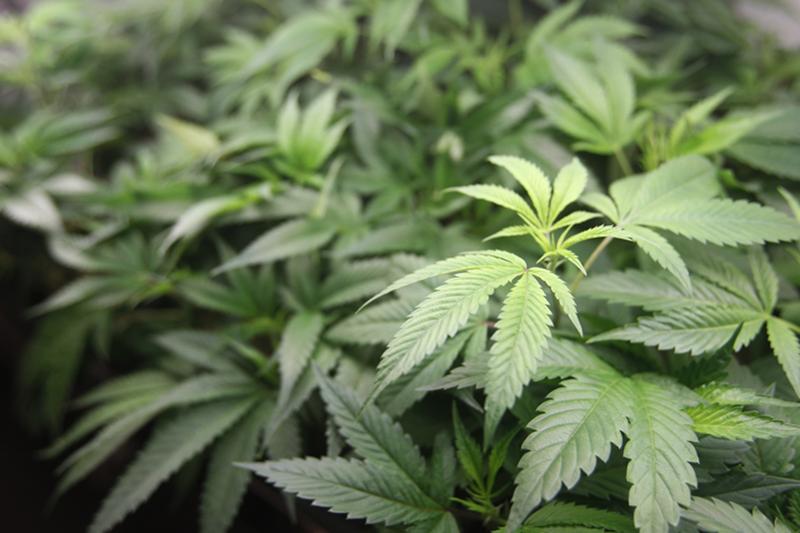
New York lawmakers failed to reach a deal to legalize recreational marijuana during the legislative session that ended last month, punting the issue until they reconvene in January of next year. The latest development in the months-long back and forth was received with mixed emotions from one group of New Yorkers who would be affected by any new laws: weed dealers.
“I'm not upset at all and I'm not surprised,” said a dealer based in Queens who asked WNYC to refer to him as “Pablo” in order to protect his identity. Pablo favors more regulation for marijuana. “I hate trash, low-quality bud and it should be regulated like everything should." But he said the fact lawmakers didn’t quite get there this session actually comes as a bit of a relief.
“That gives me more time to be ready for the legalization part of it.”
If and when New York joins the 11 states that have already legalized recreational use of marijuana, Pablo believes everything will change for those who already sell it. So he has a plan.
“Partner up with a company in California," he explained, "and hopefully that company can have ties here to New York where the legal market is opening up and I'll be a part of that."
Several other dealers who spoke to WNYC were not sure they’d be able to survive in a legal marketplace, though they said that wasn’t necessarily a bad thing.
“I am 100 percent for legalization even if that means the side-hustle is going to dissipate,” said 19-year-old Castor, another Queens-based marijuana peddler who asked WNYC to use only his first name. He said he's willing to surrender extra cash for better quality weed for everyone.
“Wouldn't you rather that we all have access to stuff and we all know what's in it?”
Legalization in other states has already transformed New York City's well-established black market, said one Brooklyn-based dealer in his early thirties who has more than a decade of experience. He asked WNYC not to reveal his name for legal reasons.
“Selling weed used to be a dream here because everybody here smokes weed. [And] it was significantly more difficult to get,” he said. But that's changed, he said, as New York City’s market has been flooded with products from states that have legalized marijuana from the west coast and more recently, states like Massachusetts and Maine. The results have been to drive down prices and make it harder for people like him to earn a living selling weed. He expects that if New York legalizes the sale of weed, that would push most smaller dealers out of business.
“Your casual weed dealer goes out the window. Eighty to 90 percent of the people who are doing it, slowly stop," he projected. “If I had grown up with legalization, I don't think I'm selling weed in high schools, I don't think I'm selling weed in college. And if I don't do those things, it's probably not coming across my mind to do it after that.”
Lawmakers have been debating what state and local tax rates should be for the sale of marijuana and how that revenue should be spent. In addition, there are differing ideas about whether or not the funds should be set aside for communities that have been most impacted by the criminalization of marijuana sale and use, if minority and women-owned businesses should be prioritized for new licenses and how to expunge the records for those with prior arrests and convictions connected to marijuana. What happens to current dealers, however, is a bit of a question mark. A task force on cannabis legalization created by Mayor Bill de Blasio released an extensive plan last December that recommended, “mandated job opportunities for those most impacted by past criminalization.”
Tracking what becomes of black market dealers when marijuana is legalized is complicated, said Harvard economist Jeffry Miron who's studied the financial impact of cannabis legalization.
“I’m not aware of any kind of systematic data source on that for obvious reasons,” Miron said. “There were some attempts to look at that for the repeal of alcohol prohibition which found that some people went out of business and some of the black market dealers went legit.”
But, Miron added, there’s another factor at play. Depending on how much regulation the state government imposes on the sale of marijuana, a black market might continue. In states like Colorado or Washington where licenses are easier to get and dispensaries are more plentiful, the black market has dissipated. But in states where it has been harder to obtain licenses like Massachusetts or California, Miron said a black market may still persist.
“Lots of people live a fairly significant distance from any retail store," he said, "So they're gonna keep buying from their next door neighbor or growing it in their backyard or buying it from the kid behind the high school."
Pablo in Queens is optimistic about the future of marijuana in New York. He says the illegality of what he does has taken its toll on him: He's been robbed, arrested, and spent time on Rikers Island. This April, he sold a vape pen to someone he now believes was an undercover cop as a few weeks, later police broke down his apartment door, confiscated his marijuana and arrested him
“They used resources, taxpayer dollars, to charge me with a misdemeanor, 4th degree,” he said. Court records and arrest papers confirm his account.
While some dealers may be anxious about legalization, Pablo said, his clients are ready.
“People want to know about marijuana. They want to know what they're getting. I totally dig that and I totally want that,” he said. “I just want to be a part of it. I don't want to be left in the dark when I've been telling people about good marijuana in the dark.”
